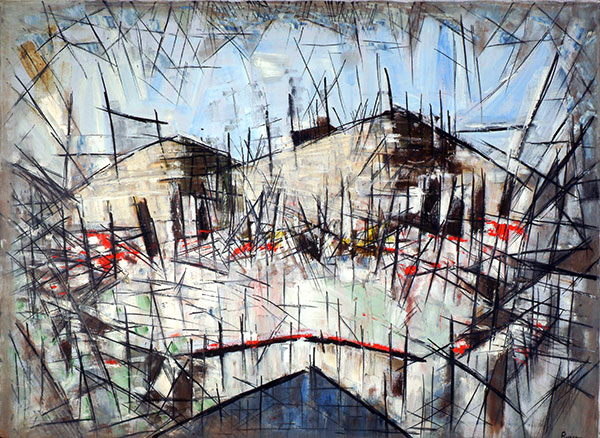Slavoj Žižek Demands Revolutionary Violence
By Paul Austin Murphy (July 2018)

Title Unknown, Arthur Pinajian, est 1950s
It may seem like a waste of time to write a piece on a 21st-century Marxist. Many people believe that Marxism is dead and gone and has been since the fall of Communism in eastern Europe and the Soviet Union. Indeed many others believed it was dead long before that—at least here in the West. Therefore, any Marxists such people acknowledge to still exist are deemed to be the largely ineffectual and harmless members of a dying cult.
McDonnell. (Žižek has classed himself as, variously, a “radical leftist,” a “communist in a qualified sense,” and, in tune with Labour’s John McDonnell, a “Marxist.”)
Sorelian myths.
In addition, because it was the case that no communist revolution was ever forthcoming in Europe and the United States, Marxists, on the whole, stopped believing in the imminent possibility of a violent revolution—even though they continued to agitate for one. Consequently, many took the advice of the Italian Marxist, Antonio Gramsci (first offered in the early 1930s). He directed Leftists to “take over the institutions” in order to create a new “hegemony.” (The Frankfurt School and many other Marxist theorists offered similar proposals.)
Foreign Policy listed him in its Top 100 Global Thinkers list in 2012. Žižek has also appeared in films and documentaries, including the 2005 film, Žižek! And it’s even the case that there’s a journal dedicated entirely to his work: the International Journal of Žižek Studies.

rebel and then bring forth a revolution. And that’s precisely why Marxists like Slavoj Žižek hate counter-revolutionaries such as the non-Marxist members of the Labour Party and “post-modernists.” Such wimps don’t demand the impossible and therefore they’ll never bring about Žižek’s Total Revolution.
sort of revolutionary hard-man’s language Lenin indulged in in his The State and Revolution.) In fact, the postmodernist “proliferation of multiple shifting identities” is, Žižek hopes, a prelude to a “new form of Terror.” And, as stated, if you demand the impossible (or if you’re “opting for the impossible”), then Terror is almost bound to follow. Take Žižek’s word for it.
Žižek is proud of his demands for the impossible. In fact those who reject them (or who deny their feasibility) are nothing less than “status quo cynics.”
But none of that matters to Žižek because defenders of capitalism believe that “nothing is really possible” simply because they would rather stick with “capitalist democracy”—thank you very much. That, to Žižek, means that they think nothing is really possible.
fascists. Yet this sounds like the language of a fascist to me. Žižek’s overall ideology may be dissimilar in some minor respects to that of a Nazi or fascist. Nonetheless, Žižek’s talk of Leftist “Terror” and violence; his Marxist absolutism, fundamentalism, and essentialism; and his love of complete change for its own sake—all that sounds pretty fascistic to me. And, as many people know, revolutionary Nazism and fascism were (at least in large part) off-shoots of 19th century revolutionary Marxism. So, all the claptrap designed to distance the International Socialists from the National Socialists needn’t be taken seriously when you think of the behaviour of the Bolsheviks, Stalin and his henchmen, Chairman Mao’s Red Guards, Pol Pot and the Khmer Rouge, and today’s street-fighting Antifa (as well as of the “anti-fash” generally).
And now, to top all that, we have the violent words and fantasies of Slavoj Žižek.
*Most of the quotes from Slavoj Žižek can be found in Contingency, Hegemony, Universality: Contemporary Dialogues on the Left (Verso)
__________________________
. His Twitter account can be found here.
More by Paul Austin Murphy.
Follow NER on Twitter @NERIconoclast